Hospitality Industry: Operational Roles, Skills, and External Analysis
VerifiedAdded on 2023/06/08
|12
|4018
|216
Report
AI Summary
This report provides an analysis of the contemporary hospitality industry, focusing on Sofitel London as a case study. It investigates various operational roles within the industry, such as housekeeping, food production, front office, and food and beverage services, while examining the skills required for these roles and the current skills shortages. The report reviews skill gaps within the hospitality industry in the context of different operational roles, analyzes the impact of these skills gaps on the hospitality business, and suggests solutions for addressing them. Furthermore, it assesses political, economic, environmental, social, legislative, and technological factors (PESTEL) that affect the development of organizations operating within the hospitality industry. A SWOT analysis is conducted to review how this information informs the decision-making process. The report evaluates the impact of external factors on the development of organizations, offering specific examples and a critical evaluation of how these factors impact current and potential trends and developments in the hospitality industry, demonstrating how the industry has developed in response.
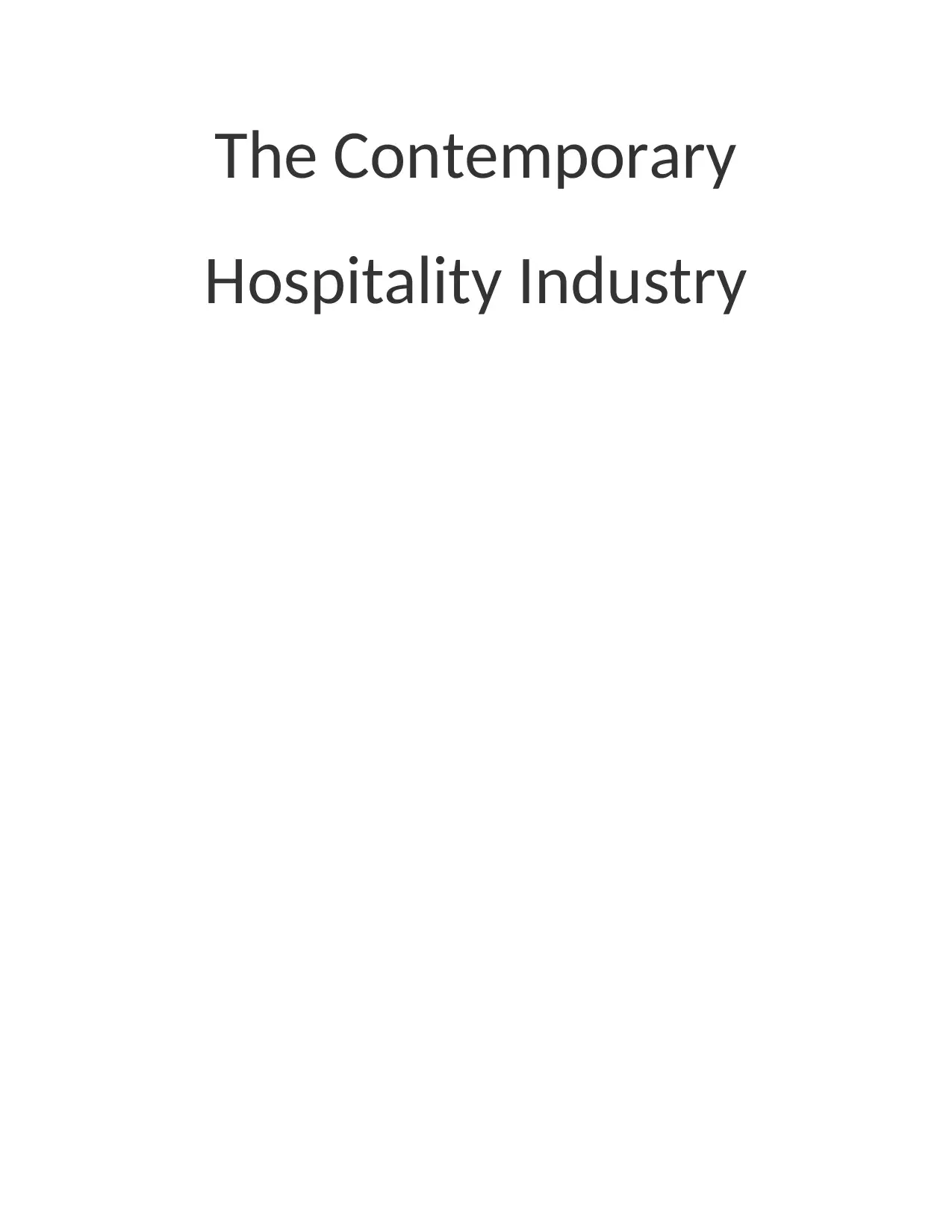
The Contemporary
Hospitality Industry
Hospitality Industry
Paraphrase This Document
Need a fresh take? Get an instant paraphrase of this document with our AI Paraphraser
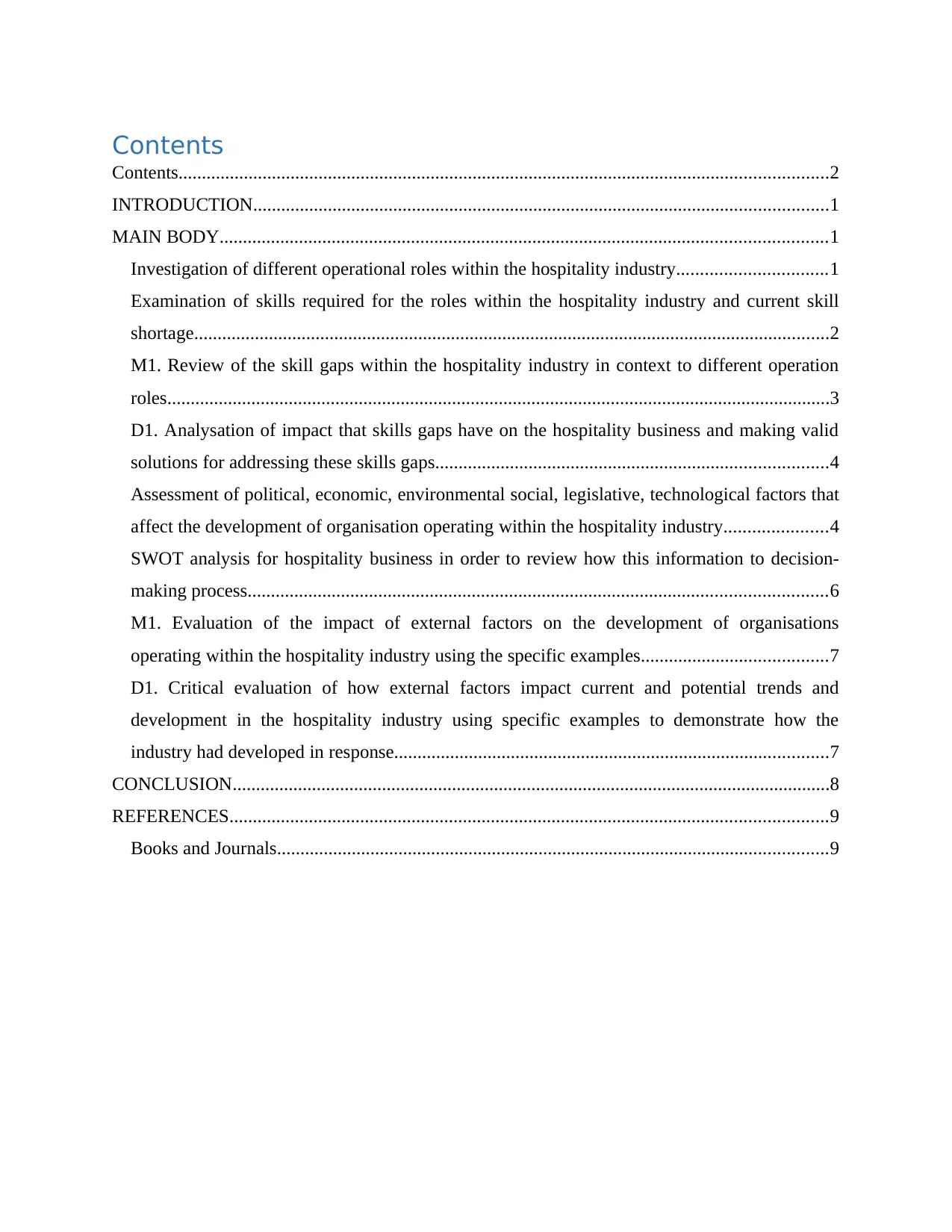
Contents
Contents...........................................................................................................................................2
INTRODUCTION...........................................................................................................................1
MAIN BODY..................................................................................................................................1
Investigation of different operational roles within the hospitality industry................................1
Examination of skills required for the roles within the hospitality industry and current skill
shortage........................................................................................................................................2
M1. Review of the skill gaps within the hospitality industry in context to different operation
roles..............................................................................................................................................3
D1. Analysation of impact that skills gaps have on the hospitality business and making valid
solutions for addressing these skills gaps....................................................................................4
Assessment of political, economic, environmental social, legislative, technological factors that
affect the development of organisation operating within the hospitality industry......................4
SWOT analysis for hospitality business in order to review how this information to decision-
making process............................................................................................................................6
M1. Evaluation of the impact of external factors on the development of organisations
operating within the hospitality industry using the specific examples........................................7
D1. Critical evaluation of how external factors impact current and potential trends and
development in the hospitality industry using specific examples to demonstrate how the
industry had developed in response.............................................................................................7
CONCLUSION................................................................................................................................8
REFERENCES................................................................................................................................9
Books and Journals......................................................................................................................9
Contents...........................................................................................................................................2
INTRODUCTION...........................................................................................................................1
MAIN BODY..................................................................................................................................1
Investigation of different operational roles within the hospitality industry................................1
Examination of skills required for the roles within the hospitality industry and current skill
shortage........................................................................................................................................2
M1. Review of the skill gaps within the hospitality industry in context to different operation
roles..............................................................................................................................................3
D1. Analysation of impact that skills gaps have on the hospitality business and making valid
solutions for addressing these skills gaps....................................................................................4
Assessment of political, economic, environmental social, legislative, technological factors that
affect the development of organisation operating within the hospitality industry......................4
SWOT analysis for hospitality business in order to review how this information to decision-
making process............................................................................................................................6
M1. Evaluation of the impact of external factors on the development of organisations
operating within the hospitality industry using the specific examples........................................7
D1. Critical evaluation of how external factors impact current and potential trends and
development in the hospitality industry using specific examples to demonstrate how the
industry had developed in response.............................................................................................7
CONCLUSION................................................................................................................................8
REFERENCES................................................................................................................................9
Books and Journals......................................................................................................................9
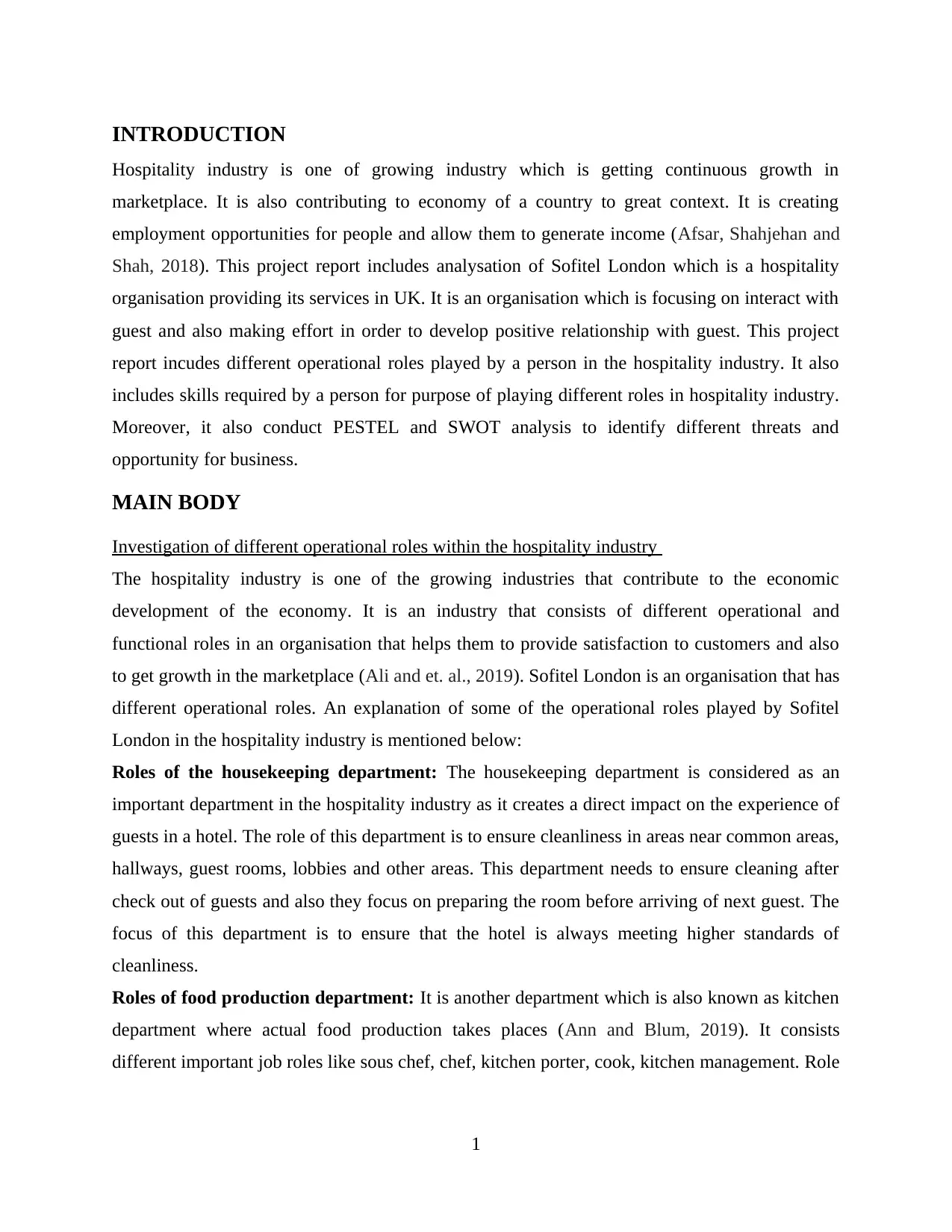
INTRODUCTION
Hospitality industry is one of growing industry which is getting continuous growth in
marketplace. It is also contributing to economy of a country to great context. It is creating
employment opportunities for people and allow them to generate income (Afsar, Shahjehan and
Shah, 2018). This project report includes analysation of Sofitel London which is a hospitality
organisation providing its services in UK. It is an organisation which is focusing on interact with
guest and also making effort in order to develop positive relationship with guest. This project
report incudes different operational roles played by a person in the hospitality industry. It also
includes skills required by a person for purpose of playing different roles in hospitality industry.
Moreover, it also conduct PESTEL and SWOT analysis to identify different threats and
opportunity for business.
MAIN BODY
Investigation of different operational roles within the hospitality industry
The hospitality industry is one of the growing industries that contribute to the economic
development of the economy. It is an industry that consists of different operational and
functional roles in an organisation that helps them to provide satisfaction to customers and also
to get growth in the marketplace (Ali and et. al., 2019). Sofitel London is an organisation that has
different operational roles. An explanation of some of the operational roles played by Sofitel
London in the hospitality industry is mentioned below:
Roles of the housekeeping department: The housekeeping department is considered as an
important department in the hospitality industry as it creates a direct impact on the experience of
guests in a hotel. The role of this department is to ensure cleanliness in areas near common areas,
hallways, guest rooms, lobbies and other areas. This department needs to ensure cleaning after
check out of guests and also they focus on preparing the room before arriving of next guest. The
focus of this department is to ensure that the hotel is always meeting higher standards of
cleanliness.
Roles of food production department: It is another department which is also known as kitchen
department where actual food production takes places (Ann and Blum, 2019). It consists
different important job roles like sous chef, chef, kitchen porter, cook, kitchen management. Role
1
Hospitality industry is one of growing industry which is getting continuous growth in
marketplace. It is also contributing to economy of a country to great context. It is creating
employment opportunities for people and allow them to generate income (Afsar, Shahjehan and
Shah, 2018). This project report includes analysation of Sofitel London which is a hospitality
organisation providing its services in UK. It is an organisation which is focusing on interact with
guest and also making effort in order to develop positive relationship with guest. This project
report incudes different operational roles played by a person in the hospitality industry. It also
includes skills required by a person for purpose of playing different roles in hospitality industry.
Moreover, it also conduct PESTEL and SWOT analysis to identify different threats and
opportunity for business.
MAIN BODY
Investigation of different operational roles within the hospitality industry
The hospitality industry is one of the growing industries that contribute to the economic
development of the economy. It is an industry that consists of different operational and
functional roles in an organisation that helps them to provide satisfaction to customers and also
to get growth in the marketplace (Ali and et. al., 2019). Sofitel London is an organisation that has
different operational roles. An explanation of some of the operational roles played by Sofitel
London in the hospitality industry is mentioned below:
Roles of the housekeeping department: The housekeeping department is considered as an
important department in the hospitality industry as it creates a direct impact on the experience of
guests in a hotel. The role of this department is to ensure cleanliness in areas near common areas,
hallways, guest rooms, lobbies and other areas. This department needs to ensure cleaning after
check out of guests and also they focus on preparing the room before arriving of next guest. The
focus of this department is to ensure that the hotel is always meeting higher standards of
cleanliness.
Roles of food production department: It is another department which is also known as kitchen
department where actual food production takes places (Ann and Blum, 2019). It consists
different important job roles like sous chef, chef, kitchen porter, cook, kitchen management. Role
1
⊘ This is a preview!⊘
Do you want full access?
Subscribe today to unlock all pages.

Trusted by 1+ million students worldwide
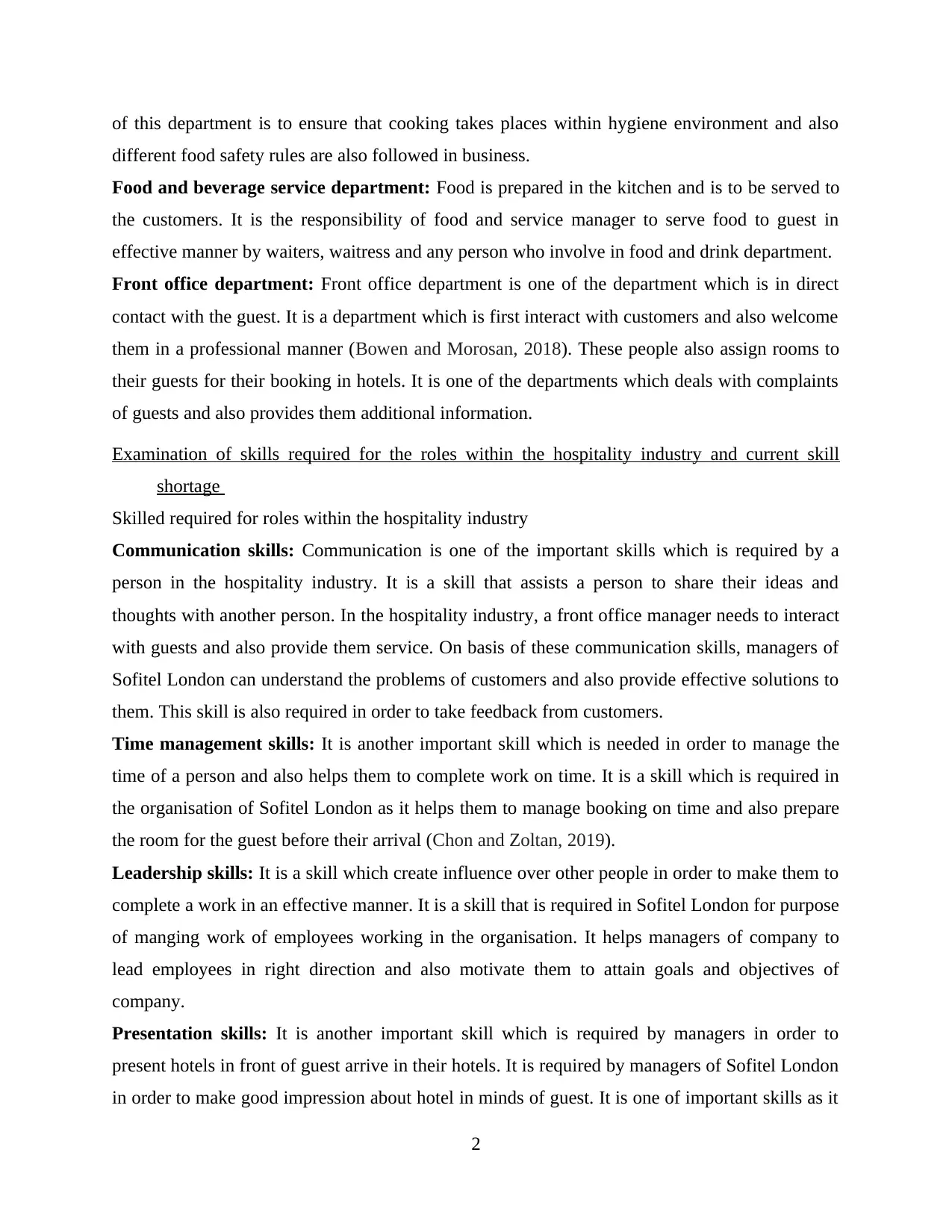
of this department is to ensure that cooking takes places within hygiene environment and also
different food safety rules are also followed in business.
Food and beverage service department: Food is prepared in the kitchen and is to be served to
the customers. It is the responsibility of food and service manager to serve food to guest in
effective manner by waiters, waitress and any person who involve in food and drink department.
Front office department: Front office department is one of the department which is in direct
contact with the guest. It is a department which is first interact with customers and also welcome
them in a professional manner (Bowen and Morosan, 2018). These people also assign rooms to
their guests for their booking in hotels. It is one of the departments which deals with complaints
of guests and also provides them additional information.
Examination of skills required for the roles within the hospitality industry and current skill
shortage
Skilled required for roles within the hospitality industry
Communication skills: Communication is one of the important skills which is required by a
person in the hospitality industry. It is a skill that assists a person to share their ideas and
thoughts with another person. In the hospitality industry, a front office manager needs to interact
with guests and also provide them service. On basis of these communication skills, managers of
Sofitel London can understand the problems of customers and also provide effective solutions to
them. This skill is also required in order to take feedback from customers.
Time management skills: It is another important skill which is needed in order to manage the
time of a person and also helps them to complete work on time. It is a skill which is required in
the organisation of Sofitel London as it helps them to manage booking on time and also prepare
the room for the guest before their arrival (Chon and Zoltan, 2019).
Leadership skills: It is a skill which create influence over other people in order to make them to
complete a work in an effective manner. It is a skill that is required in Sofitel London for purpose
of manging work of employees working in the organisation. It helps managers of company to
lead employees in right direction and also motivate them to attain goals and objectives of
company.
Presentation skills: It is another important skill which is required by managers in order to
present hotels in front of guest arrive in their hotels. It is required by managers of Sofitel London
in order to make good impression about hotel in minds of guest. It is one of important skills as it
2
different food safety rules are also followed in business.
Food and beverage service department: Food is prepared in the kitchen and is to be served to
the customers. It is the responsibility of food and service manager to serve food to guest in
effective manner by waiters, waitress and any person who involve in food and drink department.
Front office department: Front office department is one of the department which is in direct
contact with the guest. It is a department which is first interact with customers and also welcome
them in a professional manner (Bowen and Morosan, 2018). These people also assign rooms to
their guests for their booking in hotels. It is one of the departments which deals with complaints
of guests and also provides them additional information.
Examination of skills required for the roles within the hospitality industry and current skill
shortage
Skilled required for roles within the hospitality industry
Communication skills: Communication is one of the important skills which is required by a
person in the hospitality industry. It is a skill that assists a person to share their ideas and
thoughts with another person. In the hospitality industry, a front office manager needs to interact
with guests and also provide them service. On basis of these communication skills, managers of
Sofitel London can understand the problems of customers and also provide effective solutions to
them. This skill is also required in order to take feedback from customers.
Time management skills: It is another important skill which is needed in order to manage the
time of a person and also helps them to complete work on time. It is a skill which is required in
the organisation of Sofitel London as it helps them to manage booking on time and also prepare
the room for the guest before their arrival (Chon and Zoltan, 2019).
Leadership skills: It is a skill which create influence over other people in order to make them to
complete a work in an effective manner. It is a skill that is required in Sofitel London for purpose
of manging work of employees working in the organisation. It helps managers of company to
lead employees in right direction and also motivate them to attain goals and objectives of
company.
Presentation skills: It is another important skill which is required by managers in order to
present hotels in front of guest arrive in their hotels. It is required by managers of Sofitel London
in order to make good impression about hotel in minds of guest. It is one of important skills as it
2
Paraphrase This Document
Need a fresh take? Get an instant paraphrase of this document with our AI Paraphraser
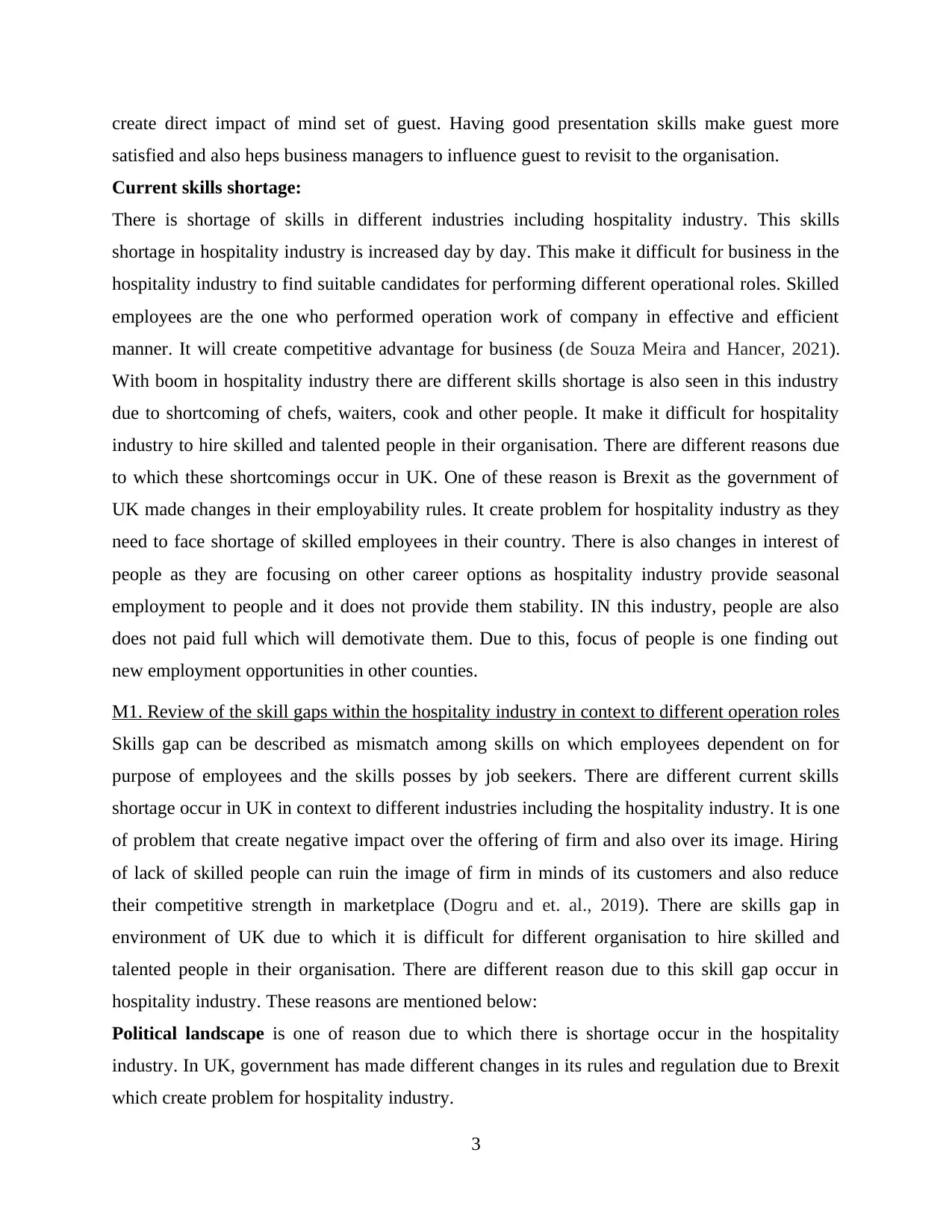
create direct impact of mind set of guest. Having good presentation skills make guest more
satisfied and also heps business managers to influence guest to revisit to the organisation.
Current skills shortage:
There is shortage of skills in different industries including hospitality industry. This skills
shortage in hospitality industry is increased day by day. This make it difficult for business in the
hospitality industry to find suitable candidates for performing different operational roles. Skilled
employees are the one who performed operation work of company in effective and efficient
manner. It will create competitive advantage for business (de Souza Meira and Hancer, 2021).
With boom in hospitality industry there are different skills shortage is also seen in this industry
due to shortcoming of chefs, waiters, cook and other people. It make it difficult for hospitality
industry to hire skilled and talented people in their organisation. There are different reasons due
to which these shortcomings occur in UK. One of these reason is Brexit as the government of
UK made changes in their employability rules. It create problem for hospitality industry as they
need to face shortage of skilled employees in their country. There is also changes in interest of
people as they are focusing on other career options as hospitality industry provide seasonal
employment to people and it does not provide them stability. IN this industry, people are also
does not paid full which will demotivate them. Due to this, focus of people is one finding out
new employment opportunities in other counties.
M1. Review of the skill gaps within the hospitality industry in context to different operation roles
Skills gap can be described as mismatch among skills on which employees dependent on for
purpose of employees and the skills posses by job seekers. There are different current skills
shortage occur in UK in context to different industries including the hospitality industry. It is one
of problem that create negative impact over the offering of firm and also over its image. Hiring
of lack of skilled people can ruin the image of firm in minds of its customers and also reduce
their competitive strength in marketplace (Dogru and et. al., 2019). There are skills gap in
environment of UK due to which it is difficult for different organisation to hire skilled and
talented people in their organisation. There are different reason due to this skill gap occur in
hospitality industry. These reasons are mentioned below:
Political landscape is one of reason due to which there is shortage occur in the hospitality
industry. In UK, government has made different changes in its rules and regulation due to Brexit
which create problem for hospitality industry.
3
satisfied and also heps business managers to influence guest to revisit to the organisation.
Current skills shortage:
There is shortage of skills in different industries including hospitality industry. This skills
shortage in hospitality industry is increased day by day. This make it difficult for business in the
hospitality industry to find suitable candidates for performing different operational roles. Skilled
employees are the one who performed operation work of company in effective and efficient
manner. It will create competitive advantage for business (de Souza Meira and Hancer, 2021).
With boom in hospitality industry there are different skills shortage is also seen in this industry
due to shortcoming of chefs, waiters, cook and other people. It make it difficult for hospitality
industry to hire skilled and talented people in their organisation. There are different reasons due
to which these shortcomings occur in UK. One of these reason is Brexit as the government of
UK made changes in their employability rules. It create problem for hospitality industry as they
need to face shortage of skilled employees in their country. There is also changes in interest of
people as they are focusing on other career options as hospitality industry provide seasonal
employment to people and it does not provide them stability. IN this industry, people are also
does not paid full which will demotivate them. Due to this, focus of people is one finding out
new employment opportunities in other counties.
M1. Review of the skill gaps within the hospitality industry in context to different operation roles
Skills gap can be described as mismatch among skills on which employees dependent on for
purpose of employees and the skills posses by job seekers. There are different current skills
shortage occur in UK in context to different industries including the hospitality industry. It is one
of problem that create negative impact over the offering of firm and also over its image. Hiring
of lack of skilled people can ruin the image of firm in minds of its customers and also reduce
their competitive strength in marketplace (Dogru and et. al., 2019). There are skills gap in
environment of UK due to which it is difficult for different organisation to hire skilled and
talented people in their organisation. There are different reason due to this skill gap occur in
hospitality industry. These reasons are mentioned below:
Political landscape is one of reason due to which there is shortage occur in the hospitality
industry. In UK, government has made different changes in its rules and regulation due to Brexit
which create problem for hospitality industry.
3
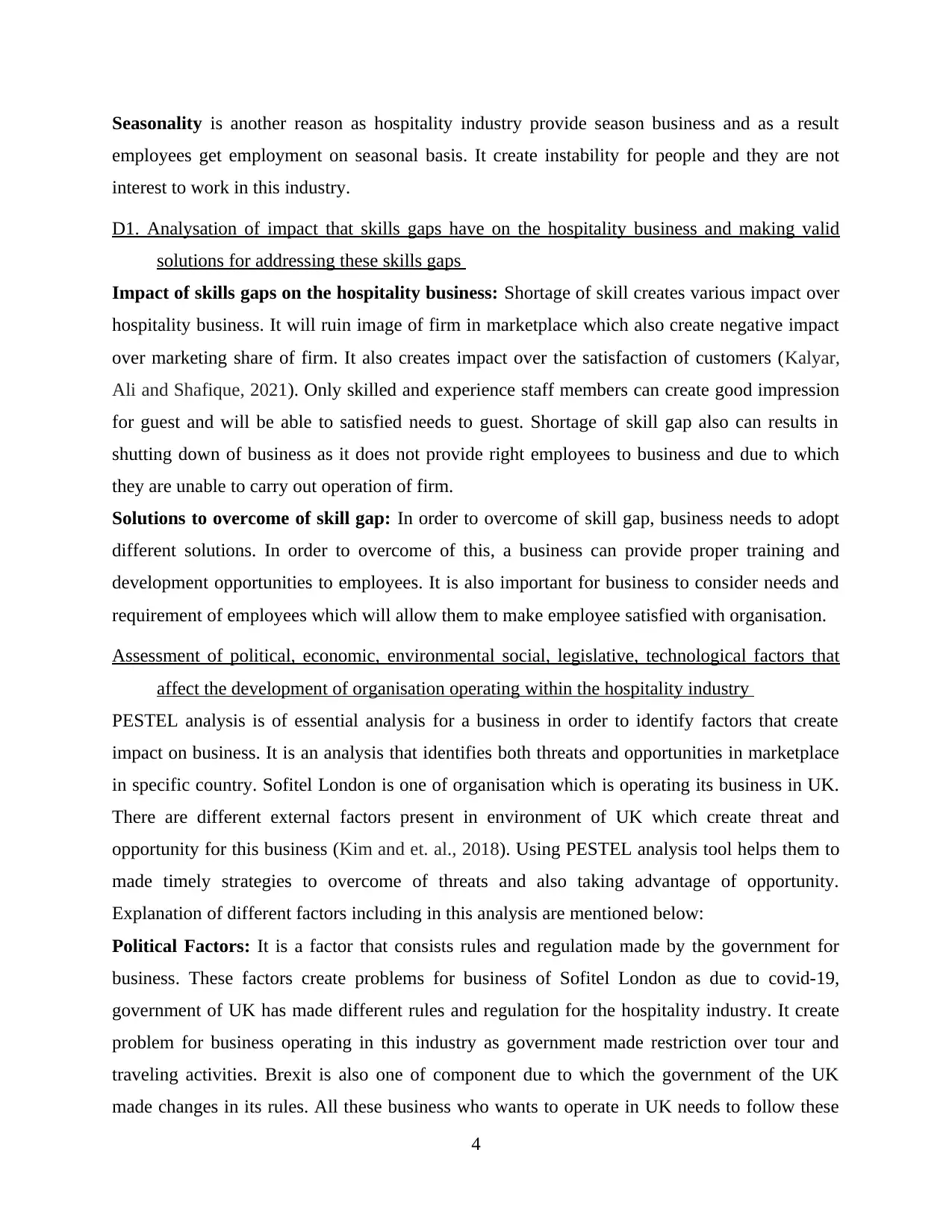
Seasonality is another reason as hospitality industry provide season business and as a result
employees get employment on seasonal basis. It create instability for people and they are not
interest to work in this industry.
D1. Analysation of impact that skills gaps have on the hospitality business and making valid
solutions for addressing these skills gaps
Impact of skills gaps on the hospitality business: Shortage of skill creates various impact over
hospitality business. It will ruin image of firm in marketplace which also create negative impact
over marketing share of firm. It also creates impact over the satisfaction of customers (Kalyar,
Ali and Shafique, 2021). Only skilled and experience staff members can create good impression
for guest and will be able to satisfied needs to guest. Shortage of skill gap also can results in
shutting down of business as it does not provide right employees to business and due to which
they are unable to carry out operation of firm.
Solutions to overcome of skill gap: In order to overcome of skill gap, business needs to adopt
different solutions. In order to overcome of this, a business can provide proper training and
development opportunities to employees. It is also important for business to consider needs and
requirement of employees which will allow them to make employee satisfied with organisation.
Assessment of political, economic, environmental social, legislative, technological factors that
affect the development of organisation operating within the hospitality industry
PESTEL analysis is of essential analysis for a business in order to identify factors that create
impact on business. It is an analysis that identifies both threats and opportunities in marketplace
in specific country. Sofitel London is one of organisation which is operating its business in UK.
There are different external factors present in environment of UK which create threat and
opportunity for this business (Kim and et. al., 2018). Using PESTEL analysis tool helps them to
made timely strategies to overcome of threats and also taking advantage of opportunity.
Explanation of different factors including in this analysis are mentioned below:
Political Factors: It is a factor that consists rules and regulation made by the government for
business. These factors create problems for business of Sofitel London as due to covid-19,
government of UK has made different rules and regulation for the hospitality industry. It create
problem for business operating in this industry as government made restriction over tour and
traveling activities. Brexit is also one of component due to which the government of the UK
made changes in its rules. All these business who wants to operate in UK needs to follow these
4
employees get employment on seasonal basis. It create instability for people and they are not
interest to work in this industry.
D1. Analysation of impact that skills gaps have on the hospitality business and making valid
solutions for addressing these skills gaps
Impact of skills gaps on the hospitality business: Shortage of skill creates various impact over
hospitality business. It will ruin image of firm in marketplace which also create negative impact
over marketing share of firm. It also creates impact over the satisfaction of customers (Kalyar,
Ali and Shafique, 2021). Only skilled and experience staff members can create good impression
for guest and will be able to satisfied needs to guest. Shortage of skill gap also can results in
shutting down of business as it does not provide right employees to business and due to which
they are unable to carry out operation of firm.
Solutions to overcome of skill gap: In order to overcome of skill gap, business needs to adopt
different solutions. In order to overcome of this, a business can provide proper training and
development opportunities to employees. It is also important for business to consider needs and
requirement of employees which will allow them to make employee satisfied with organisation.
Assessment of political, economic, environmental social, legislative, technological factors that
affect the development of organisation operating within the hospitality industry
PESTEL analysis is of essential analysis for a business in order to identify factors that create
impact on business. It is an analysis that identifies both threats and opportunities in marketplace
in specific country. Sofitel London is one of organisation which is operating its business in UK.
There are different external factors present in environment of UK which create threat and
opportunity for this business (Kim and et. al., 2018). Using PESTEL analysis tool helps them to
made timely strategies to overcome of threats and also taking advantage of opportunity.
Explanation of different factors including in this analysis are mentioned below:
Political Factors: It is a factor that consists rules and regulation made by the government for
business. These factors create problems for business of Sofitel London as due to covid-19,
government of UK has made different rules and regulation for the hospitality industry. It create
problem for business operating in this industry as government made restriction over tour and
traveling activities. Brexit is also one of component due to which the government of the UK
made changes in its rules. All these business who wants to operate in UK needs to follow these
4
⊘ This is a preview!⊘
Do you want full access?
Subscribe today to unlock all pages.

Trusted by 1+ million students worldwide
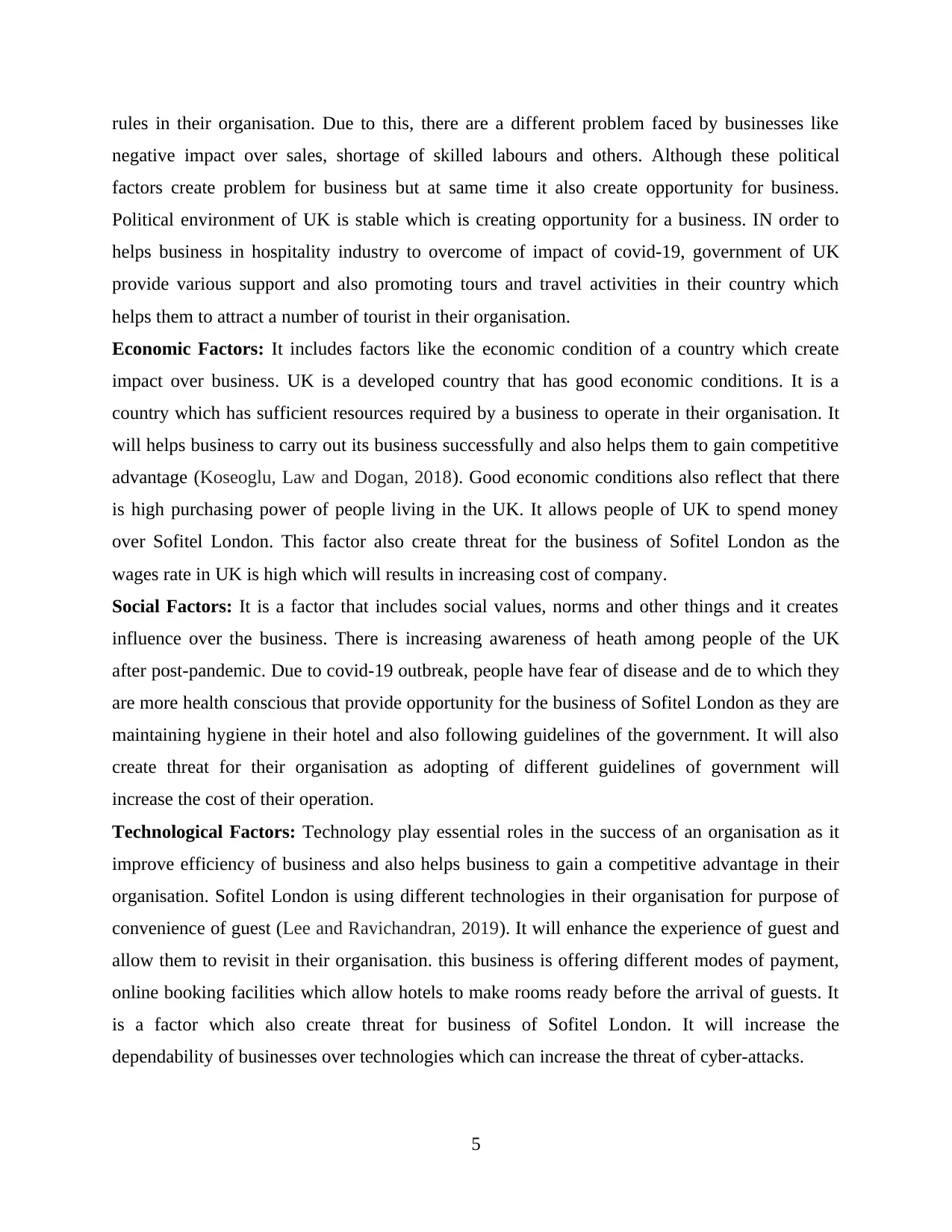
rules in their organisation. Due to this, there are a different problem faced by businesses like
negative impact over sales, shortage of skilled labours and others. Although these political
factors create problem for business but at same time it also create opportunity for business.
Political environment of UK is stable which is creating opportunity for a business. IN order to
helps business in hospitality industry to overcome of impact of covid-19, government of UK
provide various support and also promoting tours and travel activities in their country which
helps them to attract a number of tourist in their organisation.
Economic Factors: It includes factors like the economic condition of a country which create
impact over business. UK is a developed country that has good economic conditions. It is a
country which has sufficient resources required by a business to operate in their organisation. It
will helps business to carry out its business successfully and also helps them to gain competitive
advantage (Koseoglu, Law and Dogan, 2018). Good economic conditions also reflect that there
is high purchasing power of people living in the UK. It allows people of UK to spend money
over Sofitel London. This factor also create threat for the business of Sofitel London as the
wages rate in UK is high which will results in increasing cost of company.
Social Factors: It is a factor that includes social values, norms and other things and it creates
influence over the business. There is increasing awareness of heath among people of the UK
after post-pandemic. Due to covid-19 outbreak, people have fear of disease and de to which they
are more health conscious that provide opportunity for the business of Sofitel London as they are
maintaining hygiene in their hotel and also following guidelines of the government. It will also
create threat for their organisation as adopting of different guidelines of government will
increase the cost of their operation.
Technological Factors: Technology play essential roles in the success of an organisation as it
improve efficiency of business and also helps business to gain a competitive advantage in their
organisation. Sofitel London is using different technologies in their organisation for purpose of
convenience of guest (Lee and Ravichandran, 2019). It will enhance the experience of guest and
allow them to revisit in their organisation. this business is offering different modes of payment,
online booking facilities which allow hotels to make rooms ready before the arrival of guests. It
is a factor which also create threat for business of Sofitel London. It will increase the
dependability of businesses over technologies which can increase the threat of cyber-attacks.
5
negative impact over sales, shortage of skilled labours and others. Although these political
factors create problem for business but at same time it also create opportunity for business.
Political environment of UK is stable which is creating opportunity for a business. IN order to
helps business in hospitality industry to overcome of impact of covid-19, government of UK
provide various support and also promoting tours and travel activities in their country which
helps them to attract a number of tourist in their organisation.
Economic Factors: It includes factors like the economic condition of a country which create
impact over business. UK is a developed country that has good economic conditions. It is a
country which has sufficient resources required by a business to operate in their organisation. It
will helps business to carry out its business successfully and also helps them to gain competitive
advantage (Koseoglu, Law and Dogan, 2018). Good economic conditions also reflect that there
is high purchasing power of people living in the UK. It allows people of UK to spend money
over Sofitel London. This factor also create threat for the business of Sofitel London as the
wages rate in UK is high which will results in increasing cost of company.
Social Factors: It is a factor that includes social values, norms and other things and it creates
influence over the business. There is increasing awareness of heath among people of the UK
after post-pandemic. Due to covid-19 outbreak, people have fear of disease and de to which they
are more health conscious that provide opportunity for the business of Sofitel London as they are
maintaining hygiene in their hotel and also following guidelines of the government. It will also
create threat for their organisation as adopting of different guidelines of government will
increase the cost of their operation.
Technological Factors: Technology play essential roles in the success of an organisation as it
improve efficiency of business and also helps business to gain a competitive advantage in their
organisation. Sofitel London is using different technologies in their organisation for purpose of
convenience of guest (Lee and Ravichandran, 2019). It will enhance the experience of guest and
allow them to revisit in their organisation. this business is offering different modes of payment,
online booking facilities which allow hotels to make rooms ready before the arrival of guests. It
is a factor which also create threat for business of Sofitel London. It will increase the
dependability of businesses over technologies which can increase the threat of cyber-attacks.
5
Paraphrase This Document
Need a fresh take? Get an instant paraphrase of this document with our AI Paraphraser
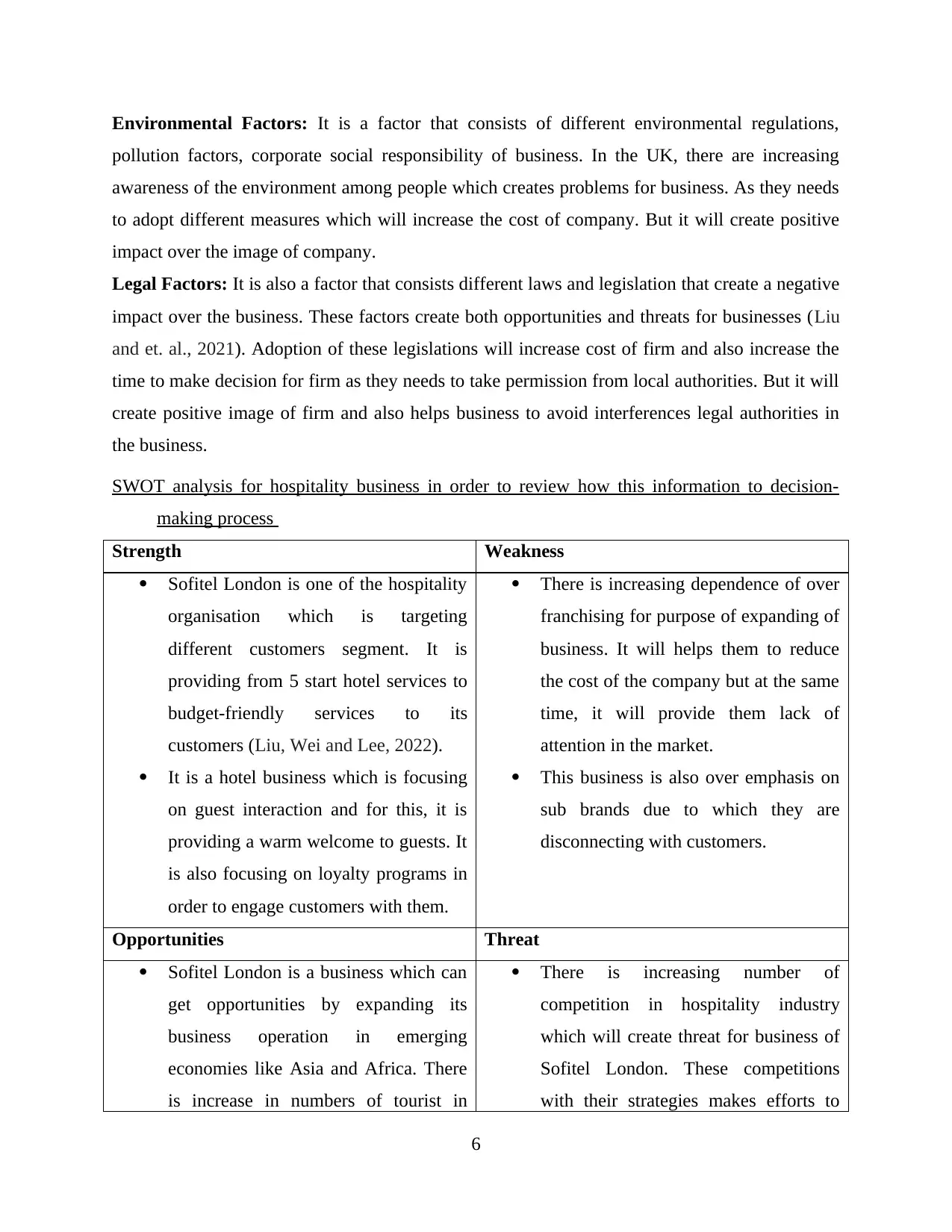
Environmental Factors: It is a factor that consists of different environmental regulations,
pollution factors, corporate social responsibility of business. In the UK, there are increasing
awareness of the environment among people which creates problems for business. As they needs
to adopt different measures which will increase the cost of company. But it will create positive
impact over the image of company.
Legal Factors: It is also a factor that consists different laws and legislation that create a negative
impact over the business. These factors create both opportunities and threats for businesses (Liu
and et. al., 2021). Adoption of these legislations will increase cost of firm and also increase the
time to make decision for firm as they needs to take permission from local authorities. But it will
create positive image of firm and also helps business to avoid interferences legal authorities in
the business.
SWOT analysis for hospitality business in order to review how this information to decision-
making process
Strength Weakness
Sofitel London is one of the hospitality
organisation which is targeting
different customers segment. It is
providing from 5 start hotel services to
budget-friendly services to its
customers (Liu, Wei and Lee, 2022).
It is a hotel business which is focusing
on guest interaction and for this, it is
providing a warm welcome to guests. It
is also focusing on loyalty programs in
order to engage customers with them.
There is increasing dependence of over
franchising for purpose of expanding of
business. It will helps them to reduce
the cost of the company but at the same
time, it will provide them lack of
attention in the market.
This business is also over emphasis on
sub brands due to which they are
disconnecting with customers.
Opportunities Threat
Sofitel London is a business which can
get opportunities by expanding its
business operation in emerging
economies like Asia and Africa. There
is increase in numbers of tourist in
There is increasing number of
competition in hospitality industry
which will create threat for business of
Sofitel London. These competitions
with their strategies makes efforts to
6
pollution factors, corporate social responsibility of business. In the UK, there are increasing
awareness of the environment among people which creates problems for business. As they needs
to adopt different measures which will increase the cost of company. But it will create positive
impact over the image of company.
Legal Factors: It is also a factor that consists different laws and legislation that create a negative
impact over the business. These factors create both opportunities and threats for businesses (Liu
and et. al., 2021). Adoption of these legislations will increase cost of firm and also increase the
time to make decision for firm as they needs to take permission from local authorities. But it will
create positive image of firm and also helps business to avoid interferences legal authorities in
the business.
SWOT analysis for hospitality business in order to review how this information to decision-
making process
Strength Weakness
Sofitel London is one of the hospitality
organisation which is targeting
different customers segment. It is
providing from 5 start hotel services to
budget-friendly services to its
customers (Liu, Wei and Lee, 2022).
It is a hotel business which is focusing
on guest interaction and for this, it is
providing a warm welcome to guests. It
is also focusing on loyalty programs in
order to engage customers with them.
There is increasing dependence of over
franchising for purpose of expanding of
business. It will helps them to reduce
the cost of the company but at the same
time, it will provide them lack of
attention in the market.
This business is also over emphasis on
sub brands due to which they are
disconnecting with customers.
Opportunities Threat
Sofitel London is a business which can
get opportunities by expanding its
business operation in emerging
economies like Asia and Africa. There
is increase in numbers of tourist in
There is increasing number of
competition in hospitality industry
which will create threat for business of
Sofitel London. These competitions
with their strategies makes efforts to
6
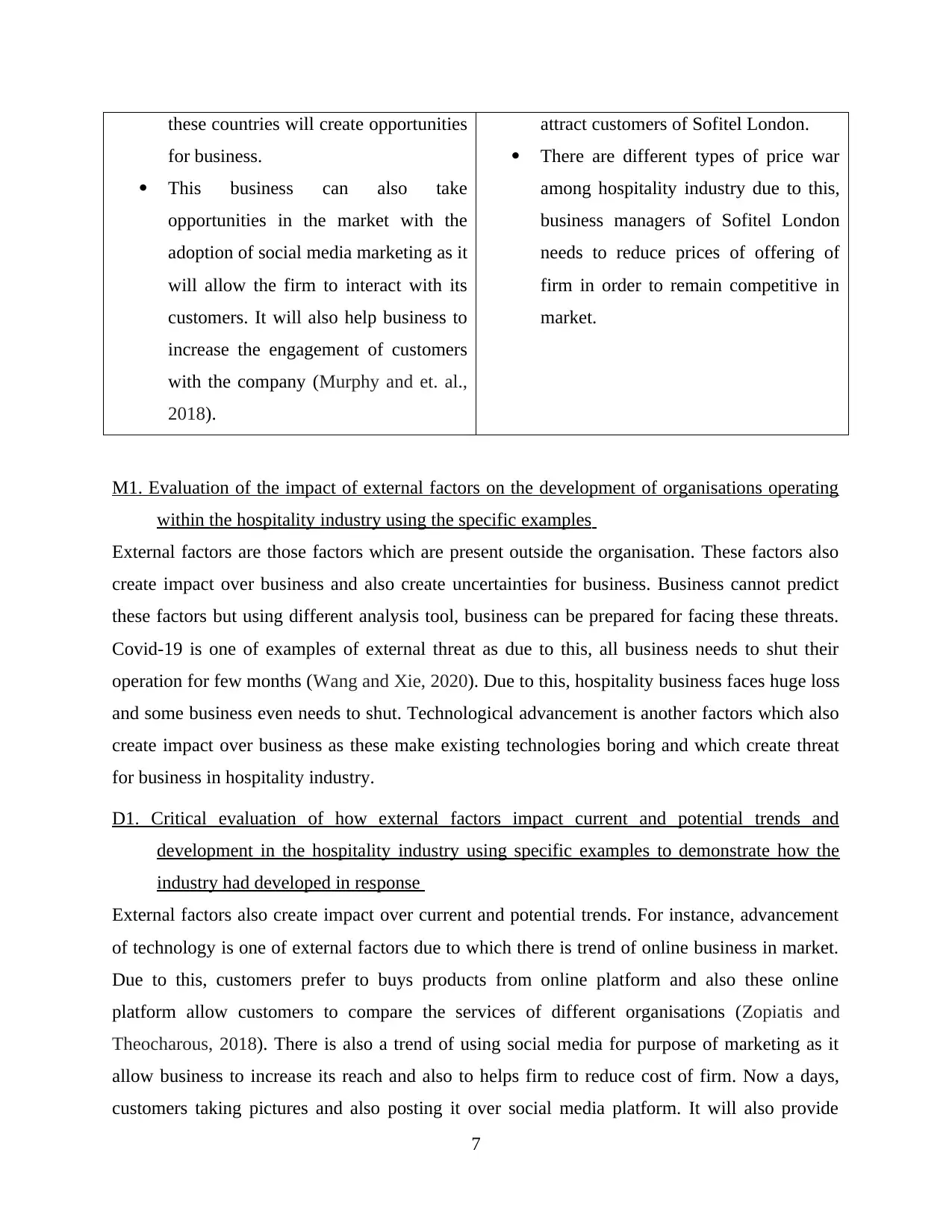
these countries will create opportunities
for business.
This business can also take
opportunities in the market with the
adoption of social media marketing as it
will allow the firm to interact with its
customers. It will also help business to
increase the engagement of customers
with the company (Murphy and et. al.,
2018).
attract customers of Sofitel London.
There are different types of price war
among hospitality industry due to this,
business managers of Sofitel London
needs to reduce prices of offering of
firm in order to remain competitive in
market.
M1. Evaluation of the impact of external factors on the development of organisations operating
within the hospitality industry using the specific examples
External factors are those factors which are present outside the organisation. These factors also
create impact over business and also create uncertainties for business. Business cannot predict
these factors but using different analysis tool, business can be prepared for facing these threats.
Covid-19 is one of examples of external threat as due to this, all business needs to shut their
operation for few months (Wang and Xie, 2020). Due to this, hospitality business faces huge loss
and some business even needs to shut. Technological advancement is another factors which also
create impact over business as these make existing technologies boring and which create threat
for business in hospitality industry.
D1. Critical evaluation of how external factors impact current and potential trends and
development in the hospitality industry using specific examples to demonstrate how the
industry had developed in response
External factors also create impact over current and potential trends. For instance, advancement
of technology is one of external factors due to which there is trend of online business in market.
Due to this, customers prefer to buys products from online platform and also these online
platform allow customers to compare the services of different organisations (Zopiatis and
Theocharous, 2018). There is also a trend of using social media for purpose of marketing as it
allow business to increase its reach and also to helps firm to reduce cost of firm. Now a days,
customers taking pictures and also posting it over social media platform. It will also provide
7
for business.
This business can also take
opportunities in the market with the
adoption of social media marketing as it
will allow the firm to interact with its
customers. It will also help business to
increase the engagement of customers
with the company (Murphy and et. al.,
2018).
attract customers of Sofitel London.
There are different types of price war
among hospitality industry due to this,
business managers of Sofitel London
needs to reduce prices of offering of
firm in order to remain competitive in
market.
M1. Evaluation of the impact of external factors on the development of organisations operating
within the hospitality industry using the specific examples
External factors are those factors which are present outside the organisation. These factors also
create impact over business and also create uncertainties for business. Business cannot predict
these factors but using different analysis tool, business can be prepared for facing these threats.
Covid-19 is one of examples of external threat as due to this, all business needs to shut their
operation for few months (Wang and Xie, 2020). Due to this, hospitality business faces huge loss
and some business even needs to shut. Technological advancement is another factors which also
create impact over business as these make existing technologies boring and which create threat
for business in hospitality industry.
D1. Critical evaluation of how external factors impact current and potential trends and
development in the hospitality industry using specific examples to demonstrate how the
industry had developed in response
External factors also create impact over current and potential trends. For instance, advancement
of technology is one of external factors due to which there is trend of online business in market.
Due to this, customers prefer to buys products from online platform and also these online
platform allow customers to compare the services of different organisations (Zopiatis and
Theocharous, 2018). There is also a trend of using social media for purpose of marketing as it
allow business to increase its reach and also to helps firm to reduce cost of firm. Now a days,
customers taking pictures and also posting it over social media platform. It will also provide
7
⊘ This is a preview!⊘
Do you want full access?
Subscribe today to unlock all pages.

Trusted by 1+ million students worldwide
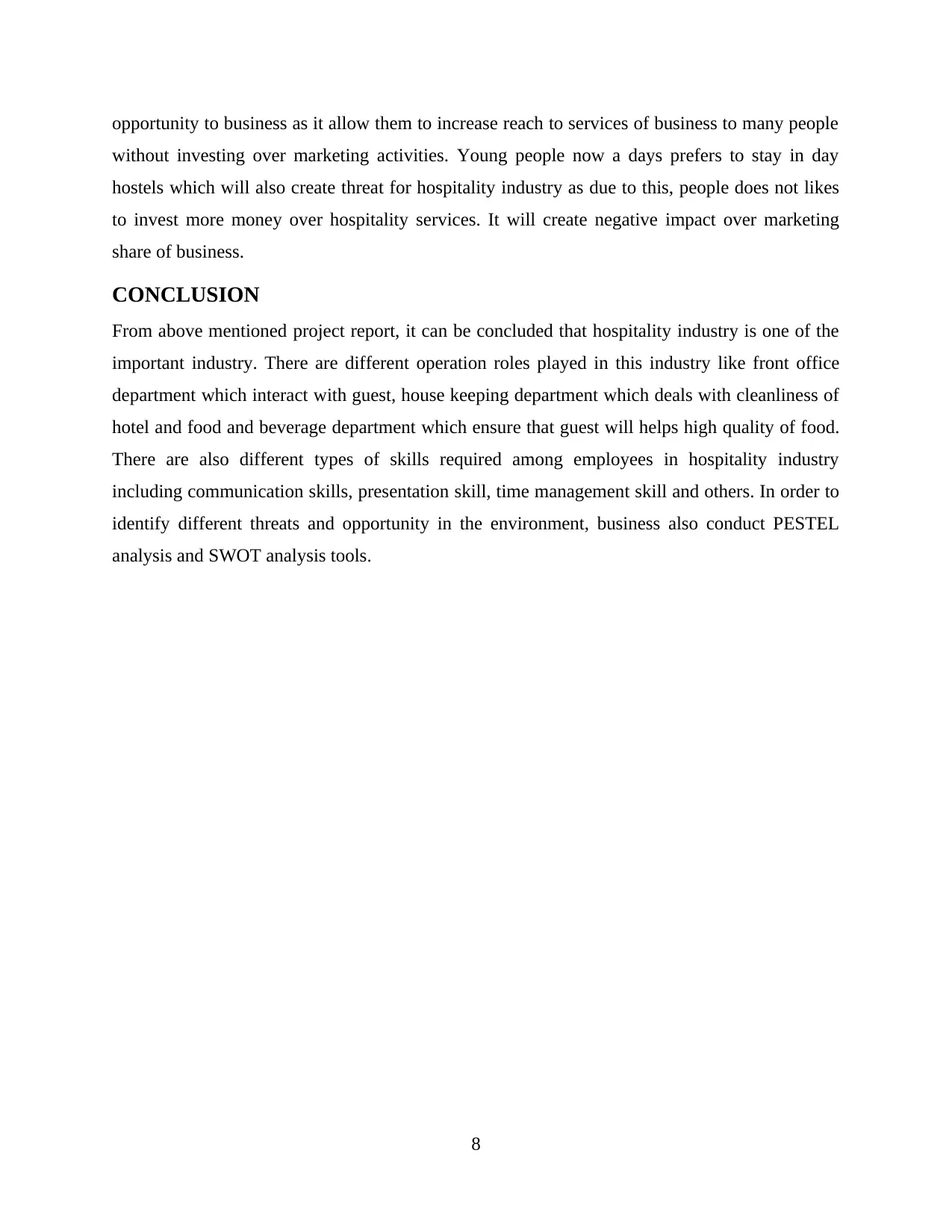
opportunity to business as it allow them to increase reach to services of business to many people
without investing over marketing activities. Young people now a days prefers to stay in day
hostels which will also create threat for hospitality industry as due to this, people does not likes
to invest more money over hospitality services. It will create negative impact over marketing
share of business.
CONCLUSION
From above mentioned project report, it can be concluded that hospitality industry is one of the
important industry. There are different operation roles played in this industry like front office
department which interact with guest, house keeping department which deals with cleanliness of
hotel and food and beverage department which ensure that guest will helps high quality of food.
There are also different types of skills required among employees in hospitality industry
including communication skills, presentation skill, time management skill and others. In order to
identify different threats and opportunity in the environment, business also conduct PESTEL
analysis and SWOT analysis tools.
8
without investing over marketing activities. Young people now a days prefers to stay in day
hostels which will also create threat for hospitality industry as due to this, people does not likes
to invest more money over hospitality services. It will create negative impact over marketing
share of business.
CONCLUSION
From above mentioned project report, it can be concluded that hospitality industry is one of the
important industry. There are different operation roles played in this industry like front office
department which interact with guest, house keeping department which deals with cleanliness of
hotel and food and beverage department which ensure that guest will helps high quality of food.
There are also different types of skills required among employees in hospitality industry
including communication skills, presentation skill, time management skill and others. In order to
identify different threats and opportunity in the environment, business also conduct PESTEL
analysis and SWOT analysis tools.
8
Paraphrase This Document
Need a fresh take? Get an instant paraphrase of this document with our AI Paraphraser
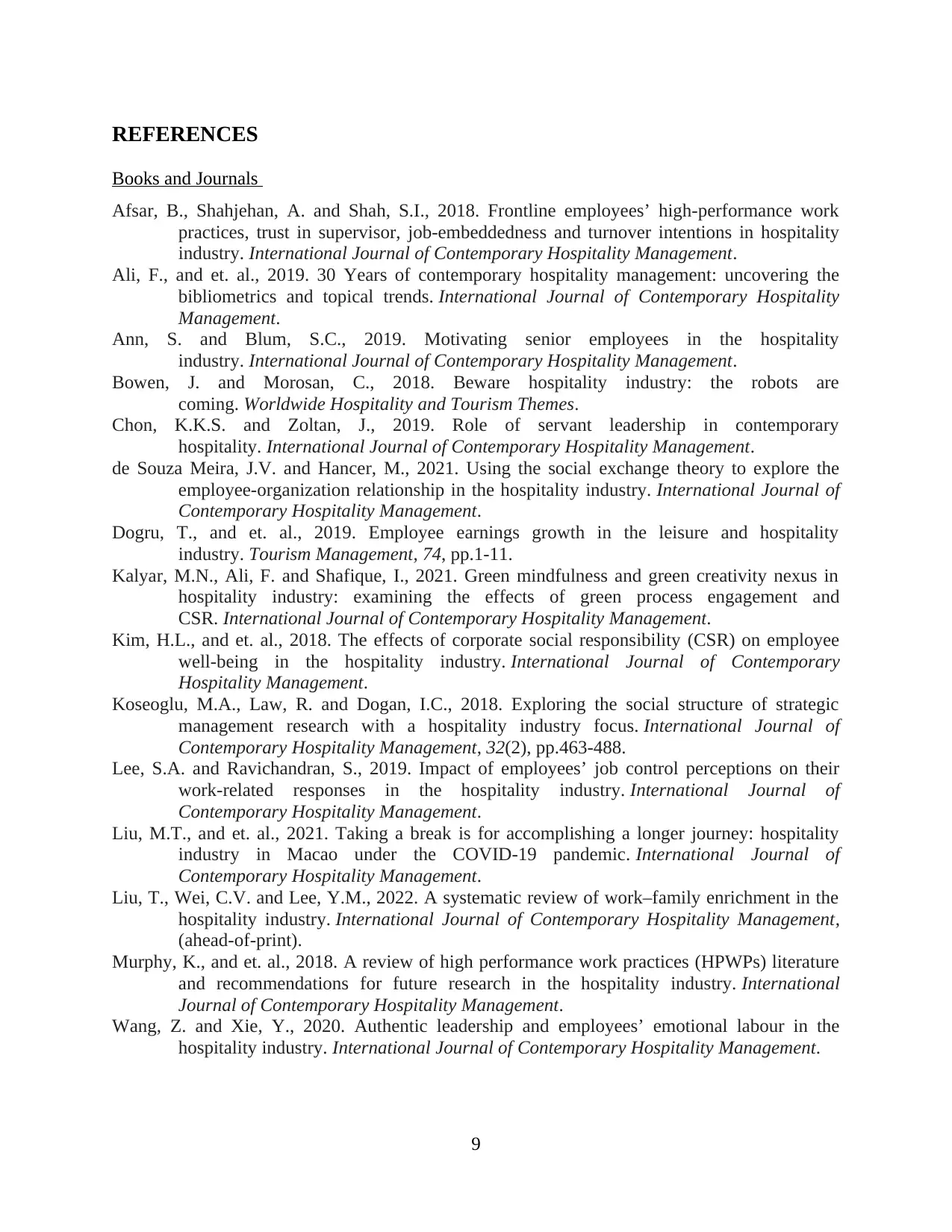
REFERENCES
Books and Journals
Afsar, B., Shahjehan, A. and Shah, S.I., 2018. Frontline employees’ high-performance work
practices, trust in supervisor, job-embeddedness and turnover intentions in hospitality
industry. International Journal of Contemporary Hospitality Management.
Ali, F., and et. al., 2019. 30 Years of contemporary hospitality management: uncovering the
bibliometrics and topical trends. International Journal of Contemporary Hospitality
Management.
Ann, S. and Blum, S.C., 2019. Motivating senior employees in the hospitality
industry. International Journal of Contemporary Hospitality Management.
Bowen, J. and Morosan, C., 2018. Beware hospitality industry: the robots are
coming. Worldwide Hospitality and Tourism Themes.
Chon, K.K.S. and Zoltan, J., 2019. Role of servant leadership in contemporary
hospitality. International Journal of Contemporary Hospitality Management.
de Souza Meira, J.V. and Hancer, M., 2021. Using the social exchange theory to explore the
employee-organization relationship in the hospitality industry. International Journal of
Contemporary Hospitality Management.
Dogru, T., and et. al., 2019. Employee earnings growth in the leisure and hospitality
industry. Tourism Management, 74, pp.1-11.
Kalyar, M.N., Ali, F. and Shafique, I., 2021. Green mindfulness and green creativity nexus in
hospitality industry: examining the effects of green process engagement and
CSR. International Journal of Contemporary Hospitality Management.
Kim, H.L., and et. al., 2018. The effects of corporate social responsibility (CSR) on employee
well-being in the hospitality industry. International Journal of Contemporary
Hospitality Management.
Koseoglu, M.A., Law, R. and Dogan, I.C., 2018. Exploring the social structure of strategic
management research with a hospitality industry focus. International Journal of
Contemporary Hospitality Management, 32(2), pp.463-488.
Lee, S.A. and Ravichandran, S., 2019. Impact of employees’ job control perceptions on their
work-related responses in the hospitality industry. International Journal of
Contemporary Hospitality Management.
Liu, M.T., and et. al., 2021. Taking a break is for accomplishing a longer journey: hospitality
industry in Macao under the COVID-19 pandemic. International Journal of
Contemporary Hospitality Management.
Liu, T., Wei, C.V. and Lee, Y.M., 2022. A systematic review of work–family enrichment in the
hospitality industry. International Journal of Contemporary Hospitality Management,
(ahead-of-print).
Murphy, K., and et. al., 2018. A review of high performance work practices (HPWPs) literature
and recommendations for future research in the hospitality industry. International
Journal of Contemporary Hospitality Management.
Wang, Z. and Xie, Y., 2020. Authentic leadership and employees’ emotional labour in the
hospitality industry. International Journal of Contemporary Hospitality Management.
9
Books and Journals
Afsar, B., Shahjehan, A. and Shah, S.I., 2018. Frontline employees’ high-performance work
practices, trust in supervisor, job-embeddedness and turnover intentions in hospitality
industry. International Journal of Contemporary Hospitality Management.
Ali, F., and et. al., 2019. 30 Years of contemporary hospitality management: uncovering the
bibliometrics and topical trends. International Journal of Contemporary Hospitality
Management.
Ann, S. and Blum, S.C., 2019. Motivating senior employees in the hospitality
industry. International Journal of Contemporary Hospitality Management.
Bowen, J. and Morosan, C., 2018. Beware hospitality industry: the robots are
coming. Worldwide Hospitality and Tourism Themes.
Chon, K.K.S. and Zoltan, J., 2019. Role of servant leadership in contemporary
hospitality. International Journal of Contemporary Hospitality Management.
de Souza Meira, J.V. and Hancer, M., 2021. Using the social exchange theory to explore the
employee-organization relationship in the hospitality industry. International Journal of
Contemporary Hospitality Management.
Dogru, T., and et. al., 2019. Employee earnings growth in the leisure and hospitality
industry. Tourism Management, 74, pp.1-11.
Kalyar, M.N., Ali, F. and Shafique, I., 2021. Green mindfulness and green creativity nexus in
hospitality industry: examining the effects of green process engagement and
CSR. International Journal of Contemporary Hospitality Management.
Kim, H.L., and et. al., 2018. The effects of corporate social responsibility (CSR) on employee
well-being in the hospitality industry. International Journal of Contemporary
Hospitality Management.
Koseoglu, M.A., Law, R. and Dogan, I.C., 2018. Exploring the social structure of strategic
management research with a hospitality industry focus. International Journal of
Contemporary Hospitality Management, 32(2), pp.463-488.
Lee, S.A. and Ravichandran, S., 2019. Impact of employees’ job control perceptions on their
work-related responses in the hospitality industry. International Journal of
Contemporary Hospitality Management.
Liu, M.T., and et. al., 2021. Taking a break is for accomplishing a longer journey: hospitality
industry in Macao under the COVID-19 pandemic. International Journal of
Contemporary Hospitality Management.
Liu, T., Wei, C.V. and Lee, Y.M., 2022. A systematic review of work–family enrichment in the
hospitality industry. International Journal of Contemporary Hospitality Management,
(ahead-of-print).
Murphy, K., and et. al., 2018. A review of high performance work practices (HPWPs) literature
and recommendations for future research in the hospitality industry. International
Journal of Contemporary Hospitality Management.
Wang, Z. and Xie, Y., 2020. Authentic leadership and employees’ emotional labour in the
hospitality industry. International Journal of Contemporary Hospitality Management.
9
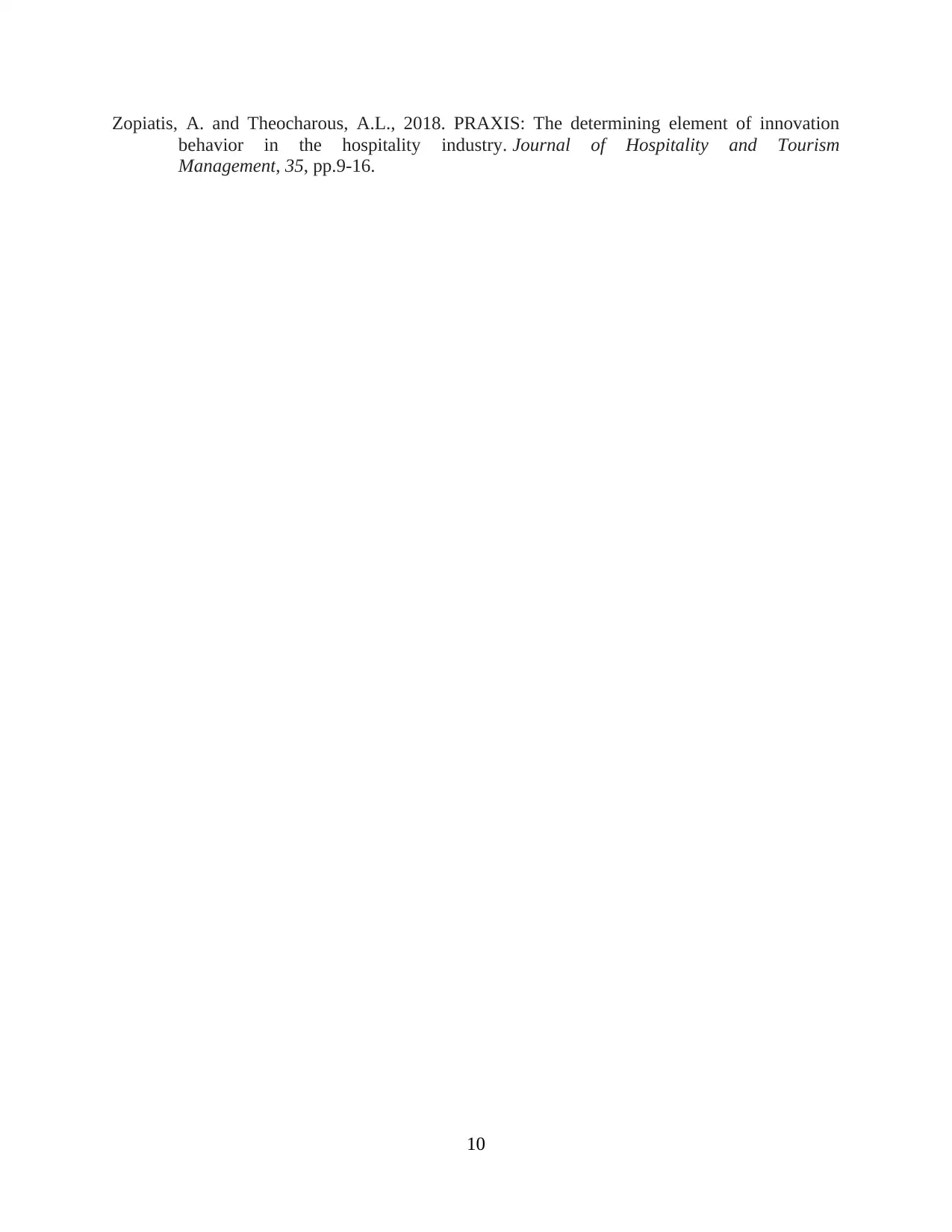
Zopiatis, A. and Theocharous, A.L., 2018. PRAXIS: The determining element of innovation
behavior in the hospitality industry. Journal of Hospitality and Tourism
Management, 35, pp.9-16.
10
behavior in the hospitality industry. Journal of Hospitality and Tourism
Management, 35, pp.9-16.
10
⊘ This is a preview!⊘
Do you want full access?
Subscribe today to unlock all pages.

Trusted by 1+ million students worldwide
1 out of 12
Related Documents
Your All-in-One AI-Powered Toolkit for Academic Success.
+13062052269
info@desklib.com
Available 24*7 on WhatsApp / Email
![[object Object]](/_next/static/media/star-bottom.7253800d.svg)
Unlock your academic potential
Copyright © 2020–2025 A2Z Services. All Rights Reserved. Developed and managed by ZUCOL.




